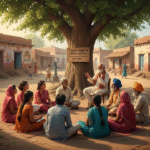Hinduism, one of the world’s oldest spiritual traditions, presents a fascinating interplay between religion and philosophy. While religion in Hinduism is often expressed through rituals, devotion, and sacred practices, its philosophical foundations delve into the nature of reality, ethics, and the ultimate purpose of life. This duality has enabled Hinduism to remain both spiritually enriching and intellectually stimulating for millennia.
Religion in Hinduism: Anchored in Rituals and Devotion
At its core, religion in Hinduism is a system offaith, rituals, and devotion. Practices such aspuja(worship),yajnas(sacrifices), and pilgrimages provide a structured framework for individuals to connect with the divine. These rituals are often prescribed in theVedas, considered the ultimate source of spiritual knowledge. Deities like Vishnu, Shiva, and Devi represent various aspects of divinity, creating a polytheistic yet deeply personal relationship between devotees and the divine.
Religious practices also emphasize community and cultural identity. Festivals likeDiwaliandHoliunite communities, reinforcing shared values and traditions. Through adherence toDharma(moral duties) andKarma(actions), Hinduism instills ethical conduct and a sense of accountability, often rooted in the belief in reincarnation and cosmic justice.
Philosophy in Hinduism: The Quest for Ultimate Truth
Philosophy in Hinduism emerges from the pursuit of truth through reason, inquiry, and introspection. Unlike religion, which often relies on faith and rituals, Hindu philosophy seeks to understand the nature of reality (Brahman) and the self (Atman) through logical exploration.
The six classical schools of Hindu philosophy—Samkhya,Yoga,Nyaya,Vaisheshika,Mimamsa, andVedanta—offer diverse approaches to unraveling existential questions. For instance:
- Vedanta: Explores the concept of non-dualism (Advaita) and the unity of the self with the ultimate reality.
- Samkhya: Provides a dualistic framework, distinguishing between consciousness (Purusha) and matter (Prakriti).
- Nyaya: Focuses on logical reasoning and epistemology to understand knowledge and truth.
These philosophical traditions often challenge dogmatic beliefs, encouraging individuals to transcend rituals and seek enlightenment through self-awareness and intellectual growth.
The Intersection: Religion Meets Philosophy
In Hinduism, religion and philosophy are not mutually exclusive; instead, they intersect to create a holistic spiritual experience. Texts like theBhagavad Gitaexemplify this synthesis. While rooted in religious devotion, the Gita also engages in philosophical discourse on duty, detachment, and the nature of reality. It introduces concepts likeKarma Yoga(path of action) andJnana Yoga(path of knowledge), demonstrating how devotion and inquiry can coexist.
This intersection is also evident in practices like meditation and yoga. While yoga is often seen as a physical discipline, its origins lie in philosophical introspection, aiming to unite the individual self with universal consciousness.
A Critical Perspective
The fusion of religion and philosophy in Hinduism has its challenges. Critics argue that excessive ritualism can overshadow philosophical inquiry, leading to dogmatism. Conversely, the abstract nature of Hindu philosophy can feel inaccessible to many adherents, creating a divide between intellectual and devotional pursuits.
However, this duality is also Hinduism’s strength. By accommodating both faith and reason, it allows followers to approach spirituality in a way that resonates personally, making it one of the most adaptable and enduring traditions.
Conclusion
The intersection of religion and philosophy in Hinduism offers a comprehensive framework for understanding life, ethics, and the divine. By harmonizing devotion with inquiry, Hinduism transcends the boundaries of faith, providing spiritual solace and intellectual fulfillment for seekers across the spectrum. This unique blend continues to make Hinduism a profound and multifaceted tradition in the modern world.










